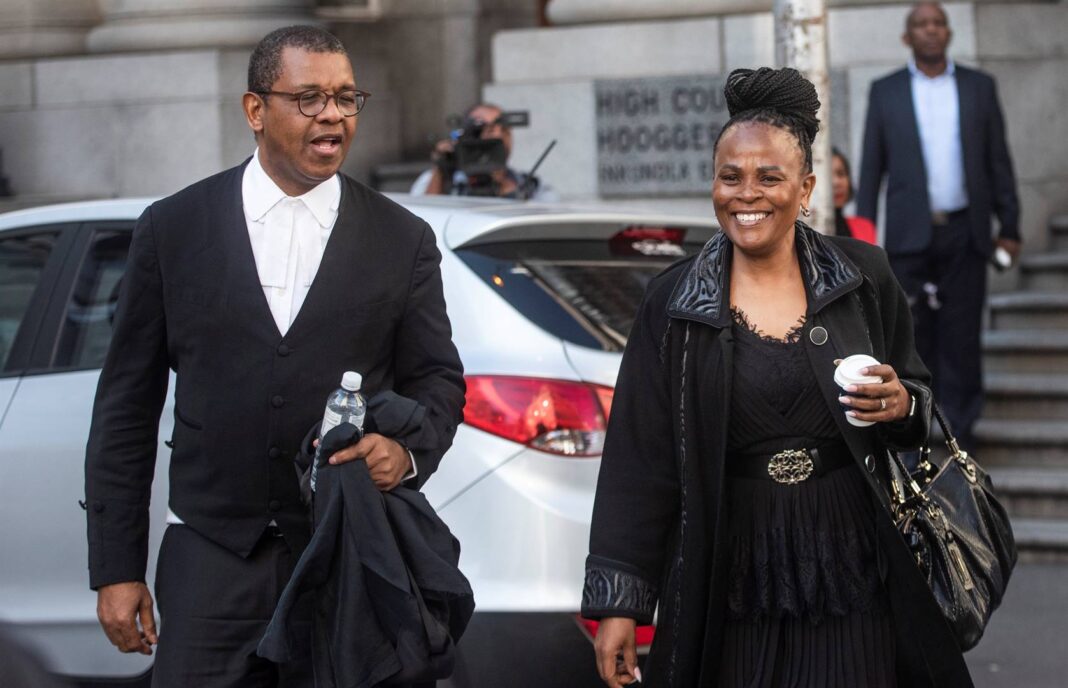Johnathan Paoli
THE North Gauteng High court has ordered the Public Protector Office of South Africa (PPSA) to provide former Public Protector Busisiwe Mkhwebane with the official record of the decision by the Chapter 9 institution not to grant her a R10 million gratuity by tomorrow and also awarding punitive costs in favour of Mkhwebane.
Delivering her ruling on Thursday, Judge Colleen Collis said the case was not ready for hearing in light of the failure of the respondents to file the rule 53 record of documents informing the decision to deny Mkhwebane gratuity.
Mkhwebane filed her notice of motion in early March and expressly called for the filing of the record and any reasons relating to public protector Kholeka Gcaleka’s decision not to pay her gratuity.
“The failure to have furnished the record has the unintended consequence that the application to date is not ripe for hearing,” Collis said.
The court stated that the case will be heard on a date to be determined by the court while the PPSA was ordered to pay Mkhwebane’s costs on an attorney-client scale.
Counsel for the public protector, advocate Tembeka Ngcukaitobi SC, objected to costs being awarded on a punitive attorney-client basis, but Mkhwebane’s lawyer, advocate Dali Mpofu SC, opposed this.
Collis agreed with Mkhwebane’s counsel that the PPSA’s answering affidavit was “premature” and granted a punitive costs order against the PPSA despite its counsel, Ngcukaitobi arguing that proper process was not followed and substantive requirements for this were not met.
In her application, Mkhwebane pleaded poverty, arguing that she could “hardly make ends meet”, given her drastic reduction in salary after she went from being Public Protector to being a member of parliament.
Nkhwebane was impeached for misconduct and incompetence and was removed from office by President Cyril Ramaphosa in September last year, weeks before the end of her seven-year term of office.
In her answering affidavit, Gcaleka said financial hardship or loss of income alone did not constitute sufficient grounds for urgent relief, and that it was an established principle of law that exceptional circumstances must be demonstrated before urgent relief can be granted on the basis of financial hardship alone, a factor which the former public protector had failed to prove.
Gcaleka denied any obligation in law to pay the gratuity, which would have come out of the Public Protector Revenue Fund, saying it was discretionary.
“By its nature, a gratuity payment creates no rights and imposes no legal obligation,” she said.
Mkhwebane said that she viewed the decision to deny her a gratuity, when all her predecessors were paid one, as discriminatory and arbitrary.
“The mere fact that, unlike me, they vacated their office at the expiry of their terms does not provide sufficient justification for any differentiation in the circumstances,” she said.
The current public protector said the office paid R31.1 million for the applicant’s legal counsel; R380 000 to the legal team; R330 000 for the traveling costs and R565 000 for protectors, in addition to incurring R147 million in costs arising from legal challenges to reports produced by Mkhwebane, including the South African Reserve Bank report, the South African Revenue Services report and the Vrede Dairy Project report.
Gcaleka maintained that as a result of Mkhwebane’s “reckless spending” on legal counsel, the office had exceeded its annual budget in relation to legal fees, and subsequently her expectation of continuing financial support from public funds was not only unreasonable, but more importantly, untenable.
INSIDE POLITICS

